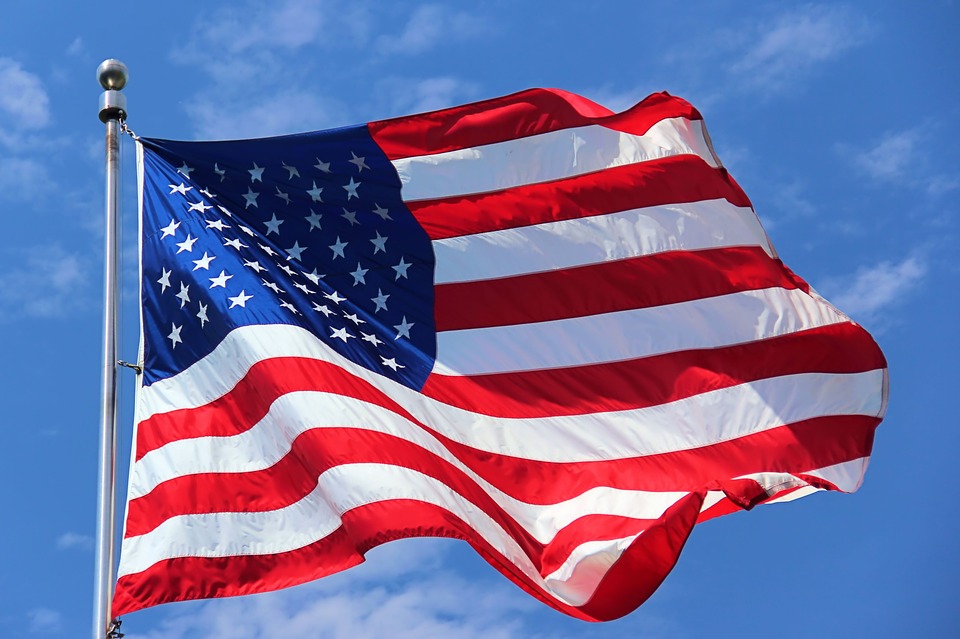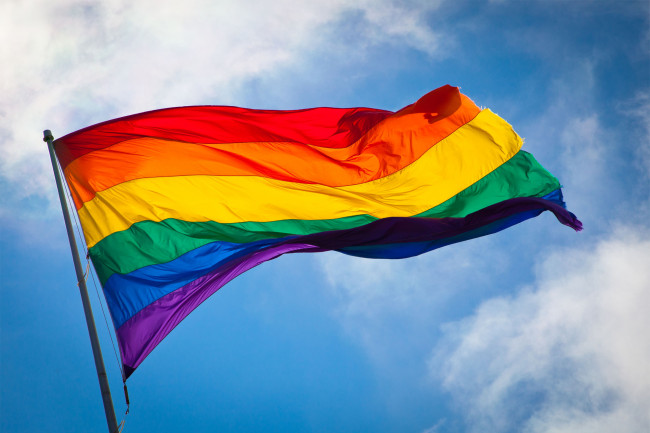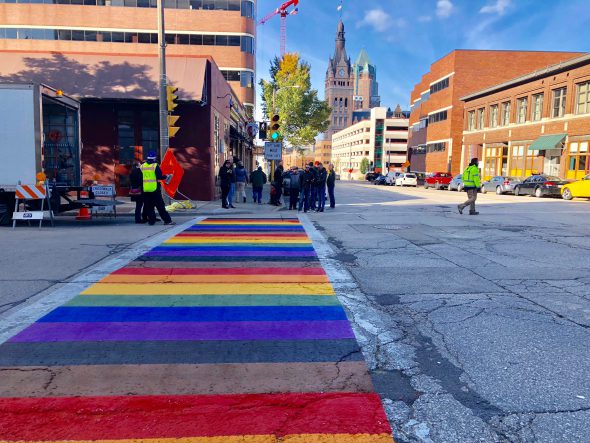The Flag Stands for LGBTQ People, Too
On July 4th, remembering those Milwaukeeans who stood up for LGBTQ rights.
Ten thousand people still care if you’re gay in Wisconsin. And they’re willing to fight a rainbow flag to prove it.
On Friday, June 7, at PrideFest Milwaukee’s 32rd annual opening ceremonies, Lt Governor Mandela Barnes announced that the Pride Flag was flying over the State Capitol for the first time in Wisconsin history.
For those of us onstage, it felt like a new day in Wisconsin. After committing countless volunteer hours, rallying for community causes against an increasingly hostile political landscape, we immediately felt seen, heard and recognized. This ceremonial gesture – which cost nothing but consideration – told Wisconsin’s LGBTQ residents that they were welcome and valued here. The Capitol flag validated what author Dick Wagner and the Wisconsin LGBTQ History Project have long said: “we’ve been here all along.”
Other states quickly followed Wisconsin’s lead with first-time pride flags of their own, including Illinois, New York and my new home state of California. Considering pride flags were banned by presidential order at U.S. embassies worldwide, these flag-flying choices felt as defiant as they felt meaningful, reminding us this wasn’t about “who was right” but “what was right.”
Governor Tony Evers explained that the flag “sends a clear and unequivocal message that Wisconsin is a welcoming and inclusive place where everyone can live without fear of prosecution, judgement or discrimination.” Simply put, it said “yes, you matter to us.”
It’s a hard message to argue with. Unfortunately, efforts to erase LGBTQ visibility and voice continue in Wisconsin, nearly two generations after we were named the “Gay Rights State” for our historic 1982 ban on gay and lesbian discrimination.
Rep.(R-Waukesha) Scott Allen proclaimed that the rainbow flag “advocates a behavior or lifestyle that some Wisconsin residents may not condone. Therefore, it is divisive.”
Julaine Appling of the Wisconsin Family Council delivered a 10,000-signature petition to Governor Evers on Tuesday, June 26. “Giving special recognition to a very narrow special interest group is inappropriate,” she said. “We want the flag taken down as soon as today.”
With only four days left in Pride Month, including the 50th Stonewall anniversary on June 28, this grandstand move seemed more of a cry for media attention than a true call to action.
Fortunately, the flag stayed put.
Visibility has tremendous power. And you can bet the Wisconsin Family Council knows that. This issue isn’t who the flag represents today, but what future the flag might inspire.
Unfortunately, this isn’t the first time someone tried to silence Wisconsin’s support for LGBTQ citizens.
On June 17, 1989, 500 people marched from Walker’s Point to Cathedral Square, where they were joined by at least 500 more for the 1st Annual Pride March and Rally. This was not today’s festive and family-friendly Pride Parade. The Pride March was an explosion of anger. Participants were not just angry at the inequalities of everyday life, but enraged that they’d lost so many friends and family to AIDS. They needed to know they’d been seen and heard.
“The rage in the air was so thick, it was like a thunderstorm,” remembered a recently-interviewed Pride Marcher, “but we were together in that storm. We had never felt so BIG before. For a moment, we felt unstoppable.”
On that day, Mayor John Norquist, County Executive Dave Schulz and State Representative David Clarenbach issued Wisconsin’s first government proclamations supporting Milwaukee Lesbian/Gay Pride Week. “We are proud of who you are,” Mayor Norquist said at the rally, launching overwhelming applause and a legacy of annual pride celebrations in Milwaukee.
Unfortunately, the applause was not unanimous. Governor Tommy Thompson took great strides to distance himself from the statements. Over 1,500 people rallied against the proclamation, demanding retractions, public apologies and even recall elections.
County Supervisor James Koconis immediately called the proclamations a “horrendous mistake.” He went on to say: “I don’t believe county government has any right to give an opinion on the lifestyle of any specific culture. The message went out that Milwaukee County endorses the lifestyle of the gay movement. In my opinion, that is anything but the truth.”
County Supervisor Elizabeth Coggs-Jones wasn’t having any of this homophobia. “This is just another form of discrimination,” she said. “When we say we are recognizing Gay Pride Week, we are just recognizing gay and lesbian citizens. I’m sure every County Supervisor represents at least one gay or lesbian. What’s wrong with recognizing them for one week?”
Alderwoman Annette Scherbert complained, “Gays should be allowed to live the way they live. But the City of Milwaukee should not be putting it up on banners, saying ‘hurray for you.’”
Common Council members condemned Norquist for using “we” in the statement “we are proud of who you are,” asking who gave him permission to speak for the City of Milwaukee. Alderwoman Mary Ann McNulty, longtime LGBTQ community champion, fired back, “The last time I checked, he was elected by the majority. That gives him the right to use ‘we.’”
The debate over the proclamation didn’t die down when Pride Week ended, either. Political pressure forced the County Board to drop plans for a 1990 Gay and Lesbian Pride Week proclamation. Although the Common Council issued their own proclamation on June 16, 1990, three members (Scherbert, Robert A. Anderson and Thomas Nardelli) took a protest vote against it. Protestors picketed City Hall and hosted a 4,000 person “rally for family values.” Both the mayor and the Common Council president were threatened with recall efforts.
“You would have thought the proclamations advocated genocide, judging from the reaction,” said McNulty, “and all it really said was, ‘all citizens must treat lesbian and gay persons with human dignity and respect, and refrain from illegal discrimination in any form.’”
In other words, America’s flag stands for all of its people.
Thirty years later, PrideFest Milwaukee is now the state’s largest annual gathering of LGBTQ people and rainbow crosswalks mark the path of the Pride March into Cathedral Square. The festival is honored with proclamations from the mayor and county executive every year. And Milwaukee’s tallest buildings, including the U.S. Bank and Northwestern Mutual towers, are illuminated in rainbows during PrideFest. (Several downtown landmarks even illuminated in the colors of the transgender flag last October during the Rally for Resistance.)
Nowadays, gay and lesbian people are often told “nobody cares if you’re gay.” Sometimes, it’s easy to believe this illusion, but it’s far from true. One of three LGBTQ youth experienced bullying today. You can still be fired or evicted for being gay today in 29 states, and in October, the Supreme Court could extend that nationwide. Anti-LGBTQ legislation seems to be forever percolating within our presidential administration. Homosexuality is still illegal in 71 countries – and is actually punishable by death in 11 nations.
These are not concerns that keep Wisconsin Family Council members awake at night.
Sure seems to me that the real “special interest” group is the one fighting against equality for all Wisconsin families – not the one celebrating every hard-earned liberty.
If you think stories like this are important, become a member of Urban Milwaukee and help support real, independent journalism. Plus you get some cool added benefits.
Out Look
-
The Enduring Legacy of Eldon Murray
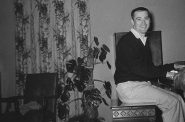 Aug 1st, 2019 by Michail Takach
Aug 1st, 2019 by Michail Takach
-
The Battle for Juneau Park
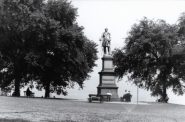 Apr 14th, 2017 by Michail Takach
Apr 14th, 2017 by Michail Takach
-
The Evolution of Drag
 Mar 30th, 2017 by Michail Takach
Mar 30th, 2017 by Michail Takach


